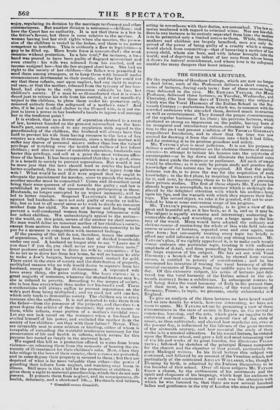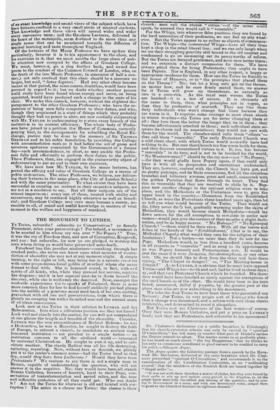THE GRESHAM LECTURES.
BY the regulations of Gresham College, which are now no longer a dead letter, each of the Professors delivers a short course, or series of lectures, (luring each term : four of these courses being thus delivered in the year. Mr. EDWARD TAYLOR, the Music- Professor, delivered three lectures, on Tuesday, Wednesday, and Thursday, (the last three days of Trinity Term); the subject of which was the Vocal Harmony of the Italian School in the Six- teenth Century ;—prelections from which we, in common with the, crowded audiences who attended them, derived much instruction as well as entertainment. They formed the proper commencement of the regular business of his chair; his previous lectures, which produced so strong an impression on the public, having been of an inaugural and introductory nature, calculated to draw atten- tion to the past and present condition of Sir THOMAS GRESHAM'S magnificent foundation, and to show that the time was now arrived for drawing it from the oblivion into which it had fallen, and for restoring it to its pristine grandeur and utility.
Mr. TAYLOR'S plan is most judicious. It is not his purpose to deliver a series of oral treatises on the abstruse theories of musical science—to attempt to initiate his hearers into the mysteries of counterpoint—or to lay down and illustrate the technical rules which must guide the composer or performer. All such at'empts would be abortive; as it is only by private study and practice that knowledge of this nature can be acquired. All that the public lecturer can do, is to pave the way for the acquisition of such knowledge; in the first place, by inspiring his hearers with a love for it, and next, by directing them as to the manner of pursuing their private studies. The first of these objects Mr. TAYLOR has already begun to accomplish, in a manner which is strikingly dis- played by the delighted attention with which his auditors hang upon his lips, and the warmth with which they express their feel- ings. The second object, we take it for granted, will not be over- looked by him at some convenient stage of his progress.
Mr. TAYLOR'S purpose, accordingly, is to give a view of this great and beautiful art, as it has been, as it is, and as it tnay be. The subject is equally extensive and interesting; embracing in- numerable details, and stretching over a large space in the his- tory of the world. Many would have adopted the ordinary and obvious course of contracting the whole of this wide field into one course or series of lectures, repeated over and over again, term after term; but necessarily treating every topic too briefly to afford any solid information or to excite any strong interest. Mr. TAYLOR'S plan, if we rightly apprehend it, is to make each termly course embrace one particular topic, treating it with sufficient amplitude of detail, and thus proceeding by successive steps over the large expanse of his subject. He has set out with Vocal Harmony ; a branch of the art which, he showed from various causes, is entitled to priority of consideration ; and he has announced his intention of tracing the vocal harmony of all the musical countries of Europe. from the middle ages to the present day. Of this extensive subject, his series of lectures just deli- vered (on the vocal harmony of the Italian school in the six- teenth century) forms a subdivision. In subsequent courses he will bring down the vocal harmony of Italy to the present time, and then treat, in a similar manner, of the vocal harmony of Germany, France, (a topic, we presume, easily exhausted,) England. To give an analysis of the three lectures we have heard would lead us into details for which, however interesting, we have not room to spare. Mr. TAvsoe set out by presenting a view of those circumstances in the state of society in Europe, on the revival of commerce, learning, and the arts, which gave an impulse to the cultivation of music. He took a general view of the state of music, as then cultivated; and showed how much the art, even at the present day, is influenced by the labours of the great masters of the sixteenth century, and how essential the study of their works is to a musical education. In his second lecture, he entered upon the Roman school, and gave a full and most interesting view of the life and works of its great thunder, the illustrious PALES.. IRINA ; followed by sketches of the principal Roman composers for the church and the chamber or that period, particularly the great Madrigal writers. In his third lecture this subject WES continued, and followed by an account of the Venetian school, and particularly of the celebrated ADMAN W1LLAERT, who, though a Fleming by birth, is admitted by the Italians themselves to be the founder of that school. Over all these subjects Mr. TAYLOR threw a charm, by the enthusiasm of his sentiments and the spirit and eloquence of his language, which kept his audience in a state of constant excitement : and such was the attention with which he was listened to, that there are now several hundred ladies and gentlemen in the city of London who must be possessed (g exact knowledge and sound views of the subject which have been hitherto confined to a very small circle of musical students. That knowledge and these views will spread wider and wider every successive term; and the Gresham Lectures, delivered in the heart of the metropolis, seem destined to do more than any single cause that can be mentioned towards the diffusion of musical learning and taste throughout England.
Of the lectures of the Music Professor we have spoken thus particularly, because it is to his appointment to the chair, and exertions in it, that we must ascribe the large share of pub- lic attention now occupied by the affairs of Gresham College. We must, howevtr, go a step further back, and award due praise to the conduct of the Common Council of London, who, on she death of the late Music Professor, (a sinecurist of half a cen- tury,) not only resolved that this chair should be a sinecure no longer, but said, " detur digniori." Had any other chair become vacant at that period, the same course, doubtless, would have been pursued in regard to it ; but we doubt whether another person could easily have been found whose energy and nerve, on being appointed, would have produced such a change in the state of his chair. We make this remark, however, without the slightest dis- paragement to the other Gresham Professors; who have the re- putation of being men fully competent to their duties, and who, though they acquiesced in a state of things which they probably thought they had no power to alter, are now cordially coiiperating with Mr. TAYLOR in endeavouring to rrstore every brunch of the instituth n to its ancient efficiency. The whole body of Profes- sors have joined in a petition the House of Commons, earnestly praying that, in the arrangements for rebuilding the Royal Ex- change, justice may be done to the memory of Sir THOMAS GRESHAM and to his noble foundation, by providing the College with accommodation such as it had before the act of gross and notorious spoliation committed by the Government of a former day—such accommodations, in short, as may enable the Profes- sors fully and effectually to perform their duties to the public. These Professors, then, are engaged in the praiseworthy object of endeavouring to put an end to their own sinecures. We have seen how Mr. TAYLOR, by his music lectures, has proved the efficacy and value of Gresham College as a means of public instiuction. The other Professors, we believe, are deliver- ing their lectures in the same place, (the City of London School) and with the same punctuality. To what extent they have been successful in creating an interest in their respective subjects, we are not in a condition to say. But all their subjects are of the utmost importance; every one of them, treated with ability and earnestness, may be rendered highly attractive as well as benefi- cial; and Gresham College may once more become a source, ac- cessible to all, of sound and useful knowledge in matters of vital moment to the welfare and happiness of mankind.



























 Previous page
Previous page